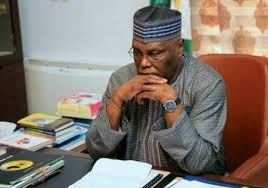The Presidency last night lampooned former Vice President and Presidential candidate of the Peoples Democratic Party, PDP, in the February 25, 2023 election, Alhaji Atiku Abubakar, over his criticism of President Bola Tinubu’s administration.
The Presidency said that the former Vice President has assumed the position of opposition-in-chief to President Tinubu and his government.
It also said that Atiku’s claim that the government’s policies have created intense cost of living pressures are not grounded on facts, claiming that recent comparative cost of living indices showed that Nigerians still enjoy the lowest cost of living in Africa.
These were contained in a statement issued by Bayo Onanuga, Special Adviser to the President on Information and Strategy, titled, “Atiku Abubakar and his new hobby.”
The Presidency said while President Tinubu and his able team are working very hard to make our country better, ensure our economy is stronger and more competitive, Atiku Abubakar and his cohorts may continue to belly ache.
The statement read: “Alhaji Atiku Abubakar has certainly found a new hobby to keep himself busy, having failed to achieve his lifelong ambition of becoming the President of the Federal Republic of Nigeria. He is increasingly carving for himself the role of opposition-in-chief to President Bola Ahmed Tinubu and his government.
“However, we notice that the former Vice-President, just like in his political contests, is also doing a poor job of it, offering pedestrian and uninformed interventions on our economy and other matters of public concerns.
“Atiku’s latest diatribe was another uncharitable commentary on the state of the economy and the efforts of the President Bola Tinubu administration in remoulding it for sustained prosperity.
“Nigerians can easily see through the hypocrisy of Alhaji Atiku, who in accusing President Tinubu of poor response to the nation’s challenges and causing pains and despair, didn’t offer any better policy options in his run for the Presidency different from the economic reform agenda being pursued by President Tinubu.
“All the major candidates agreed that the fuel subsidy regime, which had become an albatross on the economy, must end. They all agreed that the multiple exchange rates must be fixed. Where President Tinubu and Atiku differed was in selling NNPC Limited and other national assets. Atiku went for this so he could sell these important national assets to his friends and cronies.
“President Tinubu removed the subsidy from Day One and announced moves to harmonise the exchange rates. Since then, he and his economic team have been working vigorously to harmonise the rates and also end the rampant and criminal arbitrage that the multiple windows allowed.”
According to the statement, President Tinubu acknowledged, on different occasions, that the reforms his government is implementing will cause immediate pains, but will usher in an era of prosperity in the medium and long terms.
It said, “Minus Atiku, reputable local and international agencies who understand the situation the Tinubu administration found itself have commended the administration, having seen a policy trajectory that is clearly positive, realistic and sustainable.
Atiku’s claims that the private sector is shrinking and that multinational companies are leaving our companies in ‘droves’ are not grounded on facts.
“His claim that the government’s policies have created intense cost of living pressures are also not grounded on facts as recent comparative cost of living indices show that Nigerians still enjoy the lowest cost of living in Africa.
“Instead of mouthing platitudes every time in a bid to earn cheap political mileage, Alhaji Atiku who presumes himself as the leader of opposition should tell Nigerians what he would have done better if he had been elected President.”
The statement told the former Vice President to be honest enough to admit that President Tinubu inherited a weak economy, which to all intents and purposes and to ensure the survival of the country needs a complete overhaul.
It said, “The economy was plagued by decades of significant fiscal deficits, a low revenue base, high external and domestic debts, and huge debt service burden.
“The national budget Tinubu met in 2023 showed that 97 percent of revenue was to be spent on debt servicing, with little reserved for capital, thereby foreclosing growth and jobs.
“Confronted with this grim economic reality, President Tinubu faced a difficult choice of balancing the political and economic costs of reforms against the risks of economic recession. His government chose the former, to keep the economy afloat and set it back on the path of growth and prosperity.”


